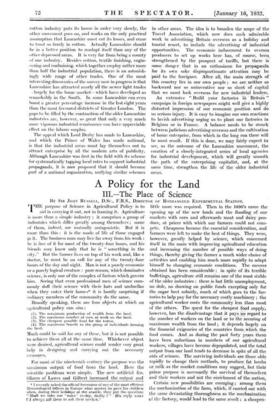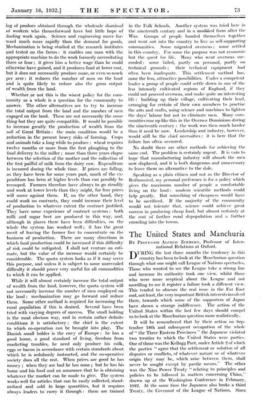A Policy for the Land III.—The Place of Science Br
SIR JOHN RUSSELL, D.Sc., F.R.S., DIRECTOR OF ROTIIAMSTED EXPERIMENTAL STATION, THE purpose of Science in Agricultural .Policy is to aid in carrying it out, not in framing it. Agriculture is more than a simple industry ; it comprises a group of industries which differ greatly among themselves ; some of them, indeed, are mutually antagonistic. But it is more than this : it is the mode of life of those engaged jir it. The business man may live far away from his work : he is free of it for most of the twenty-four hours, and his may know only that he is " something in the city." But the farmer lives on top of his work and, like a doctor, he must be on call for any of the twenty-four hours of the day and- night. Man is not a purely economio or a purely logical creature : pure reason, which dominates science, is only one of the complex of factors which govern him. Seeing that even professional men of science com- monly doff their science with their hats and umbrellas when they enter their homes* it is hardly surprising if ordinary members of the community do the same. Broadly speaking, there are four objects at which an t.gricultural policy can aim :
The maximum production of wealth, from the land.
(2). The maximum number of men at work on the land.
(3). The cheapest possible food for the towns. (4). Tho maximum benefit to the group of individuals farming the land.
Much could be said for any of these, but it is not possible to achieve them all at the same time. Whichever object were desired, agricultural science could render very great help in designing and carrying out the necessary measures.
For most of the nineteenth century the purpose was the maximum output of food from the land. Here the scientific problems were simple. The new artificial fors tilizers of Lawes and Gilbert increased the output. and
* I recently asked themfficial forecaster of one of the most efficient Meteorological Offices in Europe what answer ho gave his children when; during their holidays at the seaside, they put the question:,
" Shall wo take' our-' macs' to-day, daddy ? reply warm- t`J alwayaIell them to ask their mother," little more was required. Then in the 1890's came the opening up of the new lands and the flooding of our markets with corn and afterwards meat and dairy pro- duce, at prices with which our farmers could not com- pete. Cheapness became the essential consideration, and farmers were left to make the best of things. They were, however, greatly helped by science, which concerned, itself in the main with improving agricultural education and increasing the number of possible ways of doing things, thereby giving the farmer a much wider choice. of activities and enabling him much more rapidly:to adapt himself to changing _economic conditions. The success obtained has been considerable : in spite of its terrible buffetings, agriculture still remains one of the most stable of the older industries : there is but little. unemployment, no dole, no drawing on public funds excepting, only for the sugar beet subsidy, much of which goes, to the fac- tories to help pay for the necessary costly machinery ; the, agricultural worker costs the community less than most of the others. The quest for the cheapest fo.od supply, however, has the disadvantage that„ it pays, ;o. regard to the munber of workers on the land or to the securing of maximum wealth from, the land ;_ it .depernIS largely on the financial exigencies of the countries from.,which. the food comes. And so during the past forty. years ther:o have been reductions in numbers of our agricultural workers, villages, have become depopulated, and the total, output from our land tends to. decrease in spite ,of all, the aids of science. The surviving individuals are those: able rapidly to change their methods, to produce,_fat lambs or .milk as the market conditions may suggest, ,but their prime purpose is necessarily the survival of themselves: and their workers and not the enrichment of the nation; Certain new possibilities are . emerging ; among them the mechanization of the farm, which, if carried out with the same devastating theroughness as the mechanization, oft he factory, would lead to the same result ; a cheapen-
lug of produce obtained through the wholesale dismissal of workers who thenceforward have but little hope of finding work again. Science and engineering move for- ward Much more rapidly than the demand for goods. Mechanization is being studied at the research institutes and tested on the farms : it enables one man with the appropriate machine to do the work formerly necessitating three or four ; it gives him a better wage than he could otherwise have gained, and it produces food at lower cost, but it does not necessarily produce more, or even so much per acre : it reduces the number of men on the land and is quite likely to reduce also the gross output of wealth from the land.
Whether or not this is the wisest policy for the com- munity a,s a whole is a question for the community to answer. The other alternatives are to try to increase the total output from the land and the number of men engaged on the land. These are not necessarily the same thing but they are quite compatible. It would be possible to increase greatly the production of wealth from the soil of Great Britain : the main condition would be a reduction in the present heavy risks of farming. Crops and animals take a long while to produce : wheat requires twelve months or more from the first ploughing to the final delivery to the miller ; more than three years elapse between the selection of the mother and the collection of the first pailful of milk from the dairy cow. Expenditure is incurred during the whole time. If prices are falling, as they have been for some years past, much of the ex- penditure has been at higher levels than can possibly be recouped. Farmers therefore have always to go steadily and work at lower levels than they might, for fear prices will move against them. If, on the other hand, they could work on contracts, they could increase their level of proditetion to whatever extent the contract justified. They have some experience of contract systems : both milk and sugar beet are produced' in this way, and, although in places there have been difficulties, on the whole the system has worked well ; it has the great Merit of leaving the farmer free to concentrate on the business of production. There are many directions in which food'production could be increased if this difficulty of risk could be mitigated. I shall not venture an esti- mate, but' the value of the increase would certainly be considerable. The quota system looks as if it may serve this purpose, and unless it is subject to some unrevealed difficulty it should prove very useful for all commodities to which it can be applied.
While it will almost Certainly increase the total output of wealth from the land, however, the quota system will not necessarily increase the number of men employed on the land : mechanization may go forward and reduce them. SOme other method is required for increasing the rural poptilation if this is desired. Several have been tried with varying degrees of success. The small holding is the most obvious way, and in certain rather definite conditions it is satisfactory ; the chief is the extent to which co-operation can be brought into play. The Danish small holder is the envy of Europe : he has a good home, a good standard of living, freedom from marketing troubles, he need only produce his milk, eggs -or bacon in accordance with certain standards about Whieli lie is sedulously instructed, and the co-operative society does all the rest. When prices are good he has Money ; when they are bad he has none ; but he has his home and his food and an assurance that he is obtaining Whatever the market can be made to give. The system works well for articles that can be easily collected, stand- iodized and sold in large quantities, but it requires always leaders to carry it through : these are trained in the Folk Schools. Another system was tried here in the nineteenth century and in a modified form after the War. Groups of people banded themselves together and went out into the country to live as self-supporting communities. Some migrated overseas ; sonic settled in this country. For some the purpose was not economic but the quest for life. Many who went overseas suc- ceeded : sonic failed, partly on personal, partly on technical grounds ; their technical equipment had often been inadequate. This settlement method has. none the less, attractive possibilities. Under a competent leader a group of people could settle down in one of the less intensely cultivated regions of England, if they could not proceed overseas, and make quite an interesting life : building up their village, cultivating their land, arranging for certain of their own members to practise the arts and crafts, using science and machines to lighten the days' labour but not to eliminate men. Many com- munities rose up like this in the Oversea Dominions during the nineteenth century : the work was then much harder than it need be now. Leadership and industry, however, would still be the chief necessities : it is here that the failure has often occurred.
No doubt there are other methods for achieving the same end. The problem is certainly urgent. It is vain to hope that manufacturing industry will absorb the men now displaced, and it is both dangerous and unnecessary to leave them no alternative to the dole.
Speaking as a plain citizen and not as the Director of Rothamsted, my personal preference is for a policy which gives the maximum number of people a comfortable -living on the land : modern scientific methods could help greatly. But something of cheapness would have to he sacrificed. If the majority of the community would not tolerate that, science could achieve great success in producing cheap food, but almost certainly at the cost of further rural depopulation and a further crowding into the towns.



































 Previous page
Previous page